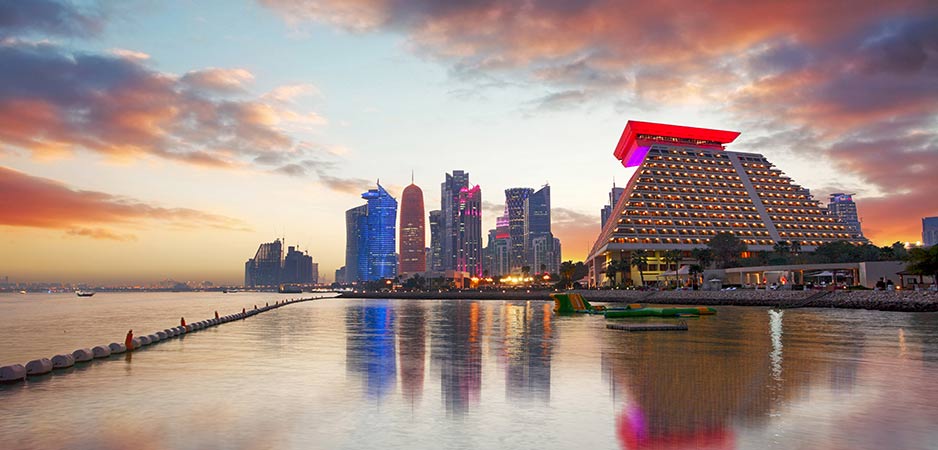As Saudi Arabia and the United Arab Emirates continue their blockade of Qatar, the pair often justify their campaign by accusing Doha of sponsoring terrorism. Most analysts have cast this claim as hypocritical, given Saudi Arabia and the UAE’s history of links to extremist groups from Afghanistan to Yemen.
Emirati and Saudi officials have also highlighted Qatar’s long-standing support for the Muslim Brotherhood, a political movement that, however controversial, no Western government has designated a terrorist organization. Further, Bahrain, a member of the anti-Qatari bloc, has accepted Islamic Minbar, an affiliate of the Muslim Brotherhood, as a legitimate political actor. Saudi Arabia too has cooperated with the Muslim Brotherhood at times, including with al-Islah, a Yemeni militia and political party affiliated with the political movement. Despite these contradictions, some of the allegations against Qatar merit further investigation.
Ulterior Motives
Whereas Saudi Arabia and the UAE face accusations that they do far too little to prevent money from flowing to terrorist groups, Qatar seems to prefer a much more direct role in its interactions with militants. The peninsular monarchy has long financed Hamas, first listed as a “foreign terrorist organization” by the United States in 1997. Meanwhile, the Taliban, some of whose factions also appear on the US list, has maintained an office in Doha since 2013; Washington has often used this office to facilitate negotiations with the Taliban.
Some policymakers, including former Qatari Prime Minister Hamad bin Jassim bin Jaber al- Thani, also suggest that Doha funneled money to al-Qaeda’s affiliates in Syria during the first years of the civil war in its rush to overthrow President Bashar al-Assad’s regime. Qatar’s decision to pay a hefty ransom for Qatari hostages held by the Iranian-funded Iraqi militia Kataib Hezbollah, another American-labeled terrorist group, further angered Saudi Arabia and the UAE. At the same time, officials in Abu Dhabi and Riyadh have engaged with the Taliban for far longer than their Qatari counterparts, even recognizing the Taliban’s regime prior to the start of Washington’s war on terror. In addition, several news agencies have reported on cooperation between Saudi Arabia, the UAE and offshoots of al-Qaeda in the Arabian Peninsula in Yemen.
The boycott of Qatar likely has less to do with Qatar’s tendency to incorporate militants into its foreign policy, than with Qatari officials’ backing of groups at odds with Saudi Arabia and the UAE’s own convention-flouting agendas. While Qatar does sponsor militants, the reductive Emirati and Saudi narrative ignores Qatar’s history of funding political parties that have never resorted to violence, among them affiliates of the Muslim Brotherhood.
Despite the extent of Saudi Arabia and the UAE’s ulterior motives for boycotting Qatar and the two regional powers’ own role in terrorism financing, the breadth and depth of Qatari officials’ contacts with Western-designated terrorist groups corroborates quite a bit of what Emirati and Saudi leaders allege. In fact, anecdotal evidence indicates that Qatar’s engagement with these organizations has continued in the years after the Emirati and Saudi-imposed boycott. In July, The New York Times reported on a call between a Qatari-linked businessman and the Qatari ambassador to Somalia, implying that the terrorist group al-Shabaab had attacked Emirati targets in Somalia in support of Qatar’s national interests.
While it is circumstantial evidence at best, the call — if confirmed — would further implicate Qatari officials. Nonetheless, Qatar seems far from alone. The UAE has also engaged with al-Shabaab, receiving much of the charcoal that the group exports through smugglers.
Collecting Dividends
Though the Emirati and Saudi allegations about Qatar’s relationship with certain Western-designated terrorist groups have proved more or less accurate, these claims belie the complexity of Qatar’s foreign policy and the dividends that it has yielded. Qatar officials’ contacts with militants have allowed the country’s diplomats and intelligence officers to act as intermediaries in prisoner swaps between these groups and the United States. Qatar’s extensive ties to Syrian insurgents enabled the country to facilitate the 2014 release of Peter Theo Curtis, an American hostage held by al-Qaeda’s Syrian franchise, the al-Nusra Front. Moreover, the Taliban’s Doha office hosted the negotiations that led to American prisoner of war Bowe Bergdahl’s return from imprisonment in Afghanistan the same year.
Qatar has also leveraged these ties to play a role in resolving the Greater Middle East’s most divisive conflicts, brokering ceasefires between Hamas and Israel, and even overseeing peace talks between the Taliban and the US. Qatar has also facilitated peace talks between factions in Lebanon, Sudan and Yemen in the past. The ongoing blockade notwithstanding, Qatar’s connections with militants in Palestine, insurgents in Afghanistan and rebels in Syria have resulted in tangible diplomatic benefits.
In some ways, Saudi Arabia and the UAE have attempted to emulate Qatar’s foreign policy. Both countries, which, unlike Qatar, provided diplomatic recognition to the Taliban’s government in Afghanistan in the 1990s, have tried to lubricate peace talks between the insurgents and Washington. Nevertheless, Qatar has managed to outcompete Saudi Arabia and the UAE in this regard, and Emirati and Saudi diplomats will find themselves hard pressed to outmaneuver Qatar there.
The multifaceted nature of Qatar’s relationship with Western-designated terrorist groups has helped the country avoid the all-encompassing penalties affecting the pariah states that the US has deemed “state sponsors of terrorism,” namely Cuba, Iran, North Korea and Sudan. American officials concluded an agreement on combating terrorism financing with their Qatari counterparts a little over two years ago, and the US seems more concerned that the dispute between Qatar and its neighbors could undermine US-led counterterrorism efforts in the Persian Gulf as a whole than about Qataris’ particular ties to militants. For their part, Saudi Arabia and the UAE have their own work to do to mitigate American concerns about terrorism financing on their territory.
Will you support FO’s journalism?
We rely on your support for our independence, diversity and quality.
The longer the row between Qatar and its rivals in the Persian Gulf persists, the more the two sides will trade accusations about state-sponsored terrorism. Qatar’s unique ties to an ever-growing range of terrorist groups seems likely to keep drawing scrutiny in any case, but Doha has so far been adept at taking advantage of its special relationships with controversial non-state actors, the dangers of blowback notwithstanding. If the last few years have taught Qatar any lessons, officials in Doha have likely learned that their controversial strategy has worked to their advantage, suggesting that Qatar’s leadership will likely continue working with Western-designated terrorist organizations.
The views expressed in this article are the author’s own and do not necessarily reflect Fair Observer’s editorial policy.
Support Fair Observer
We rely on your support for our independence, diversity and quality.
For more than 10 years, Fair Observer has been free, fair and independent. No billionaire owns us, no advertisers control us. We are a reader-supported nonprofit. Unlike many other publications, we keep our content free for readers regardless of where they live or whether they can afford to pay. We have no paywalls and no ads.
In the post-truth era of fake news, echo chambers and filter bubbles, we publish a plurality of perspectives from around the world. Anyone can publish with us, but everyone goes through a rigorous editorial process. So, you get fact-checked, well-reasoned content instead of noise.
We publish 2,500+ voices from 90+ countries. We also conduct education and training programs
on subjects ranging from digital media and journalism to writing and critical thinking. This
doesn’t come cheap. Servers, editors, trainers and web developers cost
money.
Please consider supporting us on a regular basis as a recurring donor or a
sustaining member.
Will you support FO’s journalism?
We rely on your support for our independence, diversity and quality.






